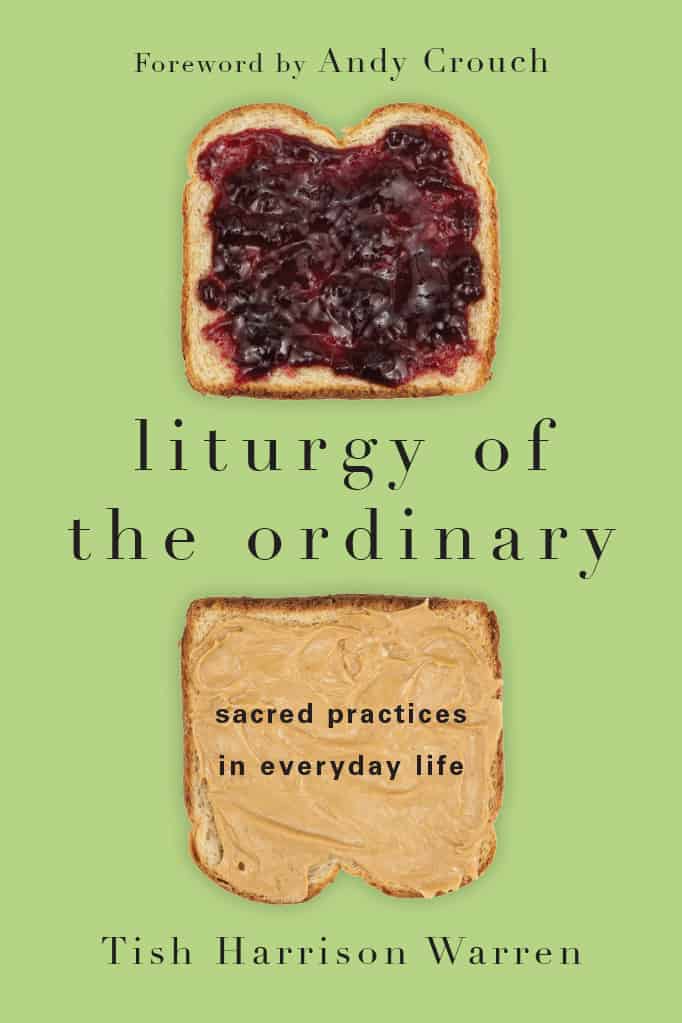
Jonathan stopped by at midday to pick something up at the house, and we had a fight. I would call it an argument, but that sounds too reasonable, like we were coolly debating opposing sides of an issue. Logical. Rational. Collected. The stuff to make marriage therapists proud.
This was hardly that.
Because most often what we’re arguing about—in this case a decision about our daughter’s schooling—isn’t really what we’re arguing about. What we are actually arguing about is our fears, anxieties, identities, and hopes. We were really arguing about how we love our daughter and feel a chasm—a terrifying chasm— between our responsibility for her and our ability to bear it well.
We were grieving the reality of our limitedness and our inability to rescue our daughter from suffering in our broken world—and even in our broken family.
And we were arguing about the sharpness in our voices, and who interrupts whom, and how often, and about a passing comment he made yesterday and a look I gave this morning.
These are the patterns in family life that make it hard to be patient and gentle and kind. I’m not mad that you threw your shirt on the floor today; I’m mad about the last three hundred times you’ve thrown your shirt on the floor. Or, more painfully, it’s not just that I’m mad about your criticism today, it’s how a pattern of criticism, comment by passing comment, bumps up against my own patterns of sin, woundedness, and self-defensiveness.
Today’s conflict is not a marital crisis—there was no profound betrayal or lie or scandal. It is a bur-under-the-saddle conflict over the kind of habitual resentment that, if we let it, builds. We start by talking about something casual. Then I fret aloud and he dismisses it—because I’ve fretted aloud so often that it is a pattern—and I say something sarcastic and it escalates from there until one or both of us yells and then one or both of us leaves the room.
Thankfully, we have a small house—we can’t get too far away from each other. So we play chicken. I sigh loudly. He gets on the computer. We wait to see who will lay down their sword first. It takes a lot of bravery to lay down a sword—more bravery than either of us have at the moment. So we sit in stony silence.
The truth is I get along with most people pretty well. When I do have conflict, it is usually with those I love most. The struggle to “love thy neighbor” is most often tested in my home, with my husband and my kids, when I’m tired, fearful, discouraged, off my game, or just want to be left alone.
For most of my twenties, I was part of a movement in evangelicalism that valued a radical, edgy kind of faith—I wanted to change the world, at least a little part of it. I wanted to be part of a community that sought justice and that served “the least of these.” What drew me to that kind of work, besides the clear call of Scripture, was a longing for and vision of God’s shalom—a very pregnant word that means God’s all-consuming, all-redeeming peace. The hope of a kingdom where God is worshiped wholly, where humanity extends love and mercy with generosity, where systemic injustice is broken and “the oppressed are set free” was (and is) inconceivably beautiful and intoxicating. So I worked among the homeless, lived briefly in a couple of Christian communities, and worked in churches trying to connect upper middleclass folks with those in poverty. I fell in love with the writings of Dorothy Day and Saint Francis and I wanted to go overseas to work among “the poorest of the poor.”
Now that I’m a bit older and a wife and mom, the radiant vision of God’s kingdom remains immensely compelling to me. And yet, though I profess big ideas about the beauty of shalom and Christ’s ministry of peace crashing into our world, I often find myself squabbling and quarreling my way through the day—with those I love the most. I’m a pacifist who yells at her husband.
I often find myself squabbling and quarreling my way through the day with those I love the most. I’m a pacifist who yells at her husband.
The band Waterdeep has a song that begins, “You talk of hating war. But where’s your own peacetime?” I can get caught up in big ideas of justice and truth and neglect the small opportunities around me to extend kindness, forgiveness, and grace.
In C. S. Lewis’s The Screwtape Letters, senior demon Screwtape coaches a junior devil on how to infect a man’s relationship with others: “Keep his mind off the most elementary of duties by directing it to the most advanced and spiritual ones. Aggravate that most useful of human characteristics, the horror and neglect of the obvious.” He continues, “I have had patients of my own so well in hand that they could be turned at a moment’s notice from impassioned prayer for a wife’s or son’s ‘soul’ to beating or insulting the real wife or son without a qualm.”
Like those under Screwtape’s influence, I often neglect the obvious, proclaiming a radical love for the world even as I neglect to care for those closest to me.
But I am increasingly aware that I cannot seek God’s peace and mission in the world without beginning right where I am, in my home, in my neighborhood, in my church, with the real people right around me.
Our neighbor, Steven, lives in our garage apartment and is one of our best friends. He is also more like an Old Testament prophet than anyone else I know. And he’s a farmer: a farmer-prophet. He’s challenging and convicting and passionate and, some would say, slightly odd. He’s the type who might bellow over a beer about society’s decay or discuss the theological significance of spider larvae. And we love that about him.
Steven started a program, Genesis Gardens, that seeks to love and serve the homeless. He spends his days growing vegetables with homeless people in our city, cultivating hope as well as the earth, growing community among the men and women who sleep on the streets.
Steven’s days look really different from mine. I hear him come and go throughout the day, on his way to do good in the world while I sit at my writing desk or change a diaper or sweep up crackers that my toddler threw on the floor.
It’s easy for me to think that Steven is doing the real work of God, that he is the peacemaker, that his life and work count and give God pleasure, while I’m just sidelined. But as I have lived alongside Steven, I have found that our ordinary days turn out to be very similar—we both seek to love, we both lose patience with those closest to us, we both have moments of hope that glimmer amid the mundane. We both seek to pass the peace in our daily life and work.
And, more and more, I’m seeing that Steven’s work and my work are inseparable. He needs me to seek peace with my husband. He needs us, as his friends, to pursue God and to love each other and our children well. He needs me to apologize to Jonathan for raising my voice in the argument we had today. He needs me to forgive.
And we need Steven. We need him to be the prophet he is, to never let us forget that the poor are among us. We need him to constantly expand our horizons beyond our front door. We need him to keep inviting us to volunteer with him and to tell us how to pray for him. We need him to sit at our table and not mind (or at least not mind too much) when our kids throw green beans across the room.
I sometimes think of my work, as a wife and a mom imperfectly seeking to love those around me, as a kind of homelessness prevention program. We want our kids to learn to build community, to be peacemakers that can go into the world and bless those around them.
Last week we met Steven at the homeless shelter downtown. He’d invited us. He held my daughter’s hand as she saw homelessness up close. “Why is that man sleeping on the sidewalk?” she whispered.
We need Steven so that our daughter can ask that question. Steven tells me stories about the men and women that he works with, often stories of sadness and tragedy. He would be the first to say that the problem of poverty is not simply a lack of money. It’s a lack of community, a lack of deep ties—family, friends, people you can count on, people to catch you when you fall. I sometimes think of my work, as a wife and a mom imperfectly seeking to love those around me, as a kind of homelessness prevention program. We want our kids to learn to build community, to be peacemakers that can go into the world and bless those around them.
Sometimes Steven, Jonathan, and I sit together on our porch at night and Steven tells us about his discouragements and his passions and dreams for our city. He tells us stories of redemption, stories of the lonely finding a family. And we talk to him about our work among scholars at the university, or about potty training and sleep deprivation. In these conversations on the porch, our work in the world, big and small, is all wrapped up together. We need each other to pursue God and to seek the peace of our city.
Steven said to me once, “You and Jonathan stabilize me. And I hope to destabilize you.” What he meant is that he won’t let us get too comfortable. He won’t let us settle into our world of kids and mortgages and family joys and squabbles, and forget that our family is part of, a microcosm of, a larger movement, the kingdom coming, the work of God to “proclaim good news to the poor . . . to proclaim liberty to the captives” (Luke 4:18). And, honestly, having our comfort challenged by our friend can be a pain in the neck. I can feel guilty. I can feel bothered. Old Testament prophets are terrible at tea parties.
We need each other to pursue God and to seek the peace of our city.
But I need my friend and I need to be reminded, more than is comfortable, of the marginalized. And he needs us: young parents who are ordinary and worn out. Even though he spoke of destabilizing us, I’m steadied by the call to remain missional and to seek peace in the small ways in front of me. Steven reminds me of reality—the world is no tea party. When I get caught up in pettiness and exhaustion, I need to be reminded that my family and community are part of a larger mission. And yet I also need to remember that my small sphere, my ordinary day, matters to the mission—that the ordinary and unnoticed passing of the peace each day is part of what God is growing in and through me. It will bring a harvest, in good time.
Biblically, there is no divide between “radical” and “ordinary” believers. We are all called to be willing to follow Christ in radical ways, to answer the call of the one who told us to deny ourselves and take up our cross. And yet we are also called to stability, to the daily grind of responsibility for those nearest us, to the challenge of a mundane, well- lived Christian life. “Passing the peace” in every way we can, in the place and sphere to which God has called us, is neither a “radical” practice nor an “ordinary” practice; it is merely a Christian practice, one that each of us must inhabit daily. We can become far too comfortable with the American status quo, and we need prophetic voices that challenge us to follow our radical, comfort-afflicting Redeemer. But we must also learn to follow Jesus in this workaday world of raising kids, caring for our neighbors, budgeting, doing laundry, and living our days responsibly with stability, generosity, and faithfulness.
Steven is getting married in a few months, and I, as his friend and sister in Christ, need him to be a peacemaker in his marriage. I’m officiating his wedding, and I will exhort him to seek peace in his new home as ardently as he does among those who are homeless, because the way he will treat his wife, behind closed doors and in the patterns of their life together, is as important in the kingdom as his work on the streets. These are his ways of seeking shalom.
Tish Harrison Warren is a priest in the Anglican Church in North America, serving at Resurrection South Austin. She has written regularly for The Well, InterVarsity’s online magazine for women in the academy and professions, Her.meneutics, and Christianity Today. Her work has also appeared in Christ and Pop Culture, Art House America, Anglicanpastor.com, and elsewhere. This excerpt was taken from Liturgy of the Ordinary by Tish Harrison Warren. Copyright (c) 2016 by Lutitia Harrison Warren. Used by permission of InterVarsity Press, P.O. Box 1400, Downers Grove, IL 60515-1426.


